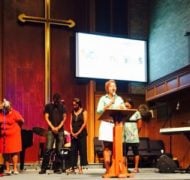What Ferguson Taught Us: Pick Up Your Corner
Blog / Produced by The High Calling
I was in the front row of the sanctuary, face-to-face with a woman’s raw pain, running liquid down her brown cheeks.
She was standing at the podium—with her eyes closed, face lifted toward heaven, arms raised. A man stood at the piano, hunting for the right notes, like he knew that worship matters most when life hurts. He found what he was looking for.
And that whole room began to hum and dance and pulse with part anguish, part praise.
Shouts of “Yes, Lord,” and “Thank you, Jesus” filled the sanctuary. The singers up front began to sway.
And God’s house erupted in stubborn worship.
It was Sunday morning in Ferguson, Missouri.
The church’s air conditioning was broken, so we all stood shoulder to shoulder in the heat—trying to keep cool by waving our printed bulletins and colorful hand fans in front of our faces.
The woman at the front of the church was leading us in worship, but she wasn’t singing. And she wasn’t waving any fans. She simply stood in the heat of her world. Our world.
She was worshipping God—I have no doubt about that—but on this day, there were no words.
Sometimes there aren’t any, you know?
The song lyrics flashed on a big screen behind her, but I didn’t move my lips either.
I could only watch her—like it was one small way for a white woman from Iowa to enter into the pain of this aching stranger, to stand with a weeping sister in her broken hallelujah. To raise my hands. To care.
Right then, I felt a tear, running down my own cheek.
Yet, it felt so small—so painfully, hopelessly small. What in the world—in this broken, cracked-up world—can my silent tears offer?
The song ended, and we all sat down. The Rev. Willis Johnson took the microphone. He told the story in Mark 2, about four men who had encountered a paralyzed man and decided they had to bring that man to Jesus.
They each picked up a corner of that man’s mat.
But because of the crowds, those men couldn’t get through the door of the room where Jesus stood. So they climbed to the top of the building, tore off the roof, and they lowered the man to Jesus. They were willing to do whatever they could to bring the man to the source of healing.
I listened as Pastor Johnson said it straight: We all have to pick up a corner of the mat. And we have to take that mat to Jesus.
“If you see a brother or a community, lying hurt on the street, you’ve got to pick up a corner of the mat,” the good pastor said. “You’ve got to decide to care. I dare you to care.”
I pulled my notebook from my purse and scribbled the words down, so I wouldn’t forget: “I dare you to care.”
The service ended, and I waited in line to talk to the reverend.
When it was my turn, I asked him how any of us could pick up the corner of that mat, when that mat in Ferguson seems so far away. What would it mean for any of us, who might never step foot in Ferguson?
He said it came down to this:
“We want your hope. Help the hurt by feeling hopeful.”
I nodded my head, shook his hand, and a few hours later, I boarded my plane for home.
*****
It’s been three days now, and I’m still trying to figure out what it really means to “help the hurt by feeling hopeful.” I’m still trying to figure out how to pick up a corner of the mat, and how to answer his “dare to care.”
On days like these—in a mixed-up world like this—any one of us can feel impossibly infinitesimal and achingly powerless. And we have no idea how to take that pastor's dare in a meaningful way.
But on Sunday, I got a small taste of what any one of us can do. It’s small, but it’s a start.
If Rev. Johnson is right, then sometimes the best thing we can do is step close enough to listen to someone’s story, right where they are—across the office, across the street, across the aisle of your own church.
Sometimes the first thing we can do? Is to step close enough to see the tears sliding down someone else’s cheek.
______________________________
 Jennifer Dukes Lee, a community editor for the High Calling, was among a group of five writers who traveled to Ferguson last weekend to listen to the stories of people who live and work in the community. Read more about that trip on the blog of our editor, Deidra Riggs, or at Jennifer’s blog. Other writers on the trip were Preston Yancey, Lisha Epperson and Nish Weiseth.
Jennifer Dukes Lee, a community editor for the High Calling, was among a group of five writers who traveled to Ferguson last weekend to listen to the stories of people who live and work in the community. Read more about that trip on the blog of our editor, Deidra Riggs, or at Jennifer’s blog. Other writers on the trip were Preston Yancey, Lisha Epperson and Nish Weiseth.
What Ferguson Taught Us About Hope
Last weekend, The High Calling and several others visited Ferguson, Missouri, to listen. We heard stories from pastors, police, and members of the community. All week, we are sharing what we learned from this experience in a bonus theme What Ferguson Taught Us, chronicling everything from our time with Capt. Ronald Johnson of the Missouri Highway Patrol to our time with people on the street.
" … hope does not disappoint, because the love of God has been poured out within our hearts through the Holy Spirit who was given to us." Romans 5:5





